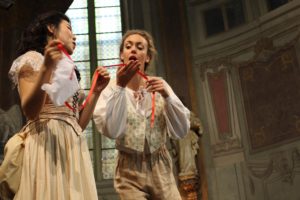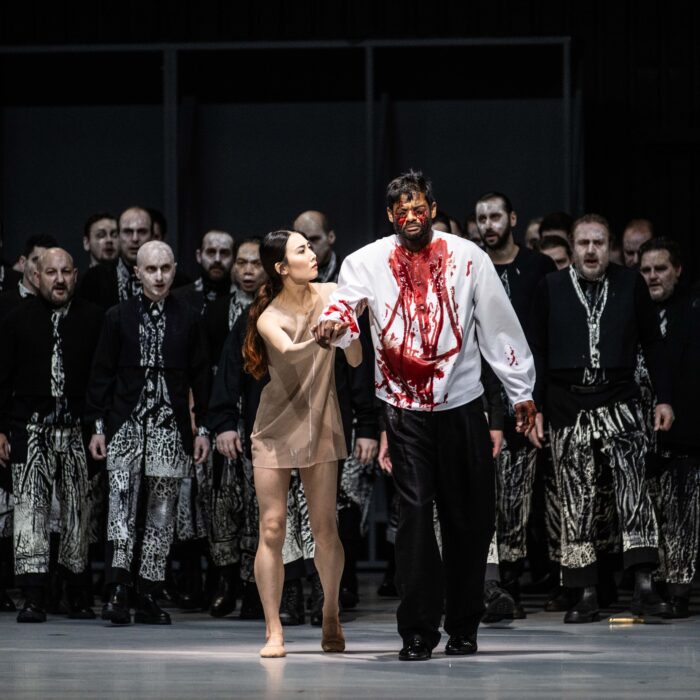
Prague Summer Nights 2017 Review – Le Nozze Di Figaro: A Solid Cast Makes For An Enjoyable Evening Of Mozart
By Francisco SalazarMozart’s “Le Nozze di Figaro” is considered a masterpiece on all levels, musically and dramatically. But it is also an opera that is incredibly complicated to stage. A production needs great singing actors who meet the demands that Mozart and da Ponte required. Luckily, the Prague Summer Nights lined up a cast that was very well directed by Maria Zouves and Sherrill Milnes.
The Almavivas
Perhaps the strongest singer of the night was Taueen Moon as The Count. From the moment he walked on stage it was evident that this was a singer with authority and command and incredible stage presence. Throughout the evening he chased Susanna around, his advances aggressive and intense. Their duet together in Act three saw him phrase each line smoothly to complement a suave seduction. With Cherubino, Moon was aggressive, running after him everytime he spotted the young boy invading his space. His aria “Hai gia vinta la causa…Vedrò mentr’io sospiro” was characterized with a booming voice that floated over the orchestra. Here he gave the count a rough edge that accentuated his injured pride. We got to see a more gentle quality in the final scene in which he begged forgiveness of his wife. Down on his knees, he delivered that glorious musical passage with tenderness, his potent sound replaced by a thread of sound that could melt any listener.
As the Countess Laura Basse entered with delicate tone in her “Porgi Amor.” Each phrase was shaped with subtlety, the soprano opting for withholding from a forte outburst, giving the character dignity and really making us feel her suffering. One interesting aspect that was added is that in this production the Countess sees the Count and Susanna flirting and Basse reacted with terror and fear as she imagined the consequences. But this was no weak character as Basse gave the character a lightness that allowed audiences to see her playful nature. Her “Dove Sono” had a more commanding presence, particularly in the second section as she released her full volume soaring and showing a strong woman ready for anything. That of course was confirmed at the end as she and Susanna play a trick on the Count. During this scene, Basse flirted and moved about quickly, finding a new gear of joviality. She even created a lighter tone to her voice to match that of her Susanna.
Susanna and Figaro
As Susanna Ahyoung Jeong kept a joyous tone throughout the whole evening running and dancing around. Her voice always kept a light tone, almost as if this was a young woman who took everything with a relaxed manner. You could even see that in Jeong’s face as she radiated happiness the entire night. From her first entrance to the scene where she replaces Cherubino in the closet, Jeong kept the voice nimble and flexible. Only at the end of the second Act did we see the colors change, growing darker and heavier in tone. She also became combative as she dueled it out with Barbarina, chasing after her in their Act one duet. During her duet with the Count, she also played it light. While Moon’s Count was seductive, she kept phrases short and staccato almost as if she were laughing at him, this action compounded by her twirling around him. In her aria “Giunse alfin il momento…Deh vieni, non tardar,” Jeong sang with finesse, showing off the clarity of her upper register and the range of her voice. There was playfulness to the aria but it also showed a more mature character. The “Canzonetta sull’aria” showcased two sopranos who could easily combine their voices to create an effect as if one voice was singing. One of the interesting things Jeong did during the garden scene was she created a darker and richer color to sound more like Basse’s soprano. It proved incredibly fitting and it showed how far Jeong was willing to go as an actress.
John Holland portrayed Figaro with gusto. He was playful, whether it was with his guitar or with a puppet. He relished each moment and made the most of the props he had. His “Si Vuo Ballare” was sung with an ardent tone while his “Non più andrai” was dance-like in his phrasing. Holland was very dedicated to his text, making the most of major words and even imposing a buffo style at other moments. Holland sang his final aria with gravitas. Where lines in his initial solos were not necessarily connected in their phrasing, here they were, giving the passage a more introspective feel.
The Solid Supporting Cast
As Cherubino Hannah Fraser showed an earthy vocal quality in her two arias especially in “Voi Che Sapete,” where voice relished in the long lines Mozart gives this character. She played the character with a timidity and it almost seemed as her Cherubino was always uncomfortable. Of course, there was a flirtatious nature as Fraser’s constantly gave winks toward the Countess and Susanna.
As Marcellina Theresa Egan was graceful, looking extremely serious and commanding. She gave off an air of superiority until the end when she finds out that Figaro is her lost son. Egan showed off a creamy and large mezzo voice that easily filled the hall with sound. John Hartman had an appealing voice as Bartolo and his aria “La Vendetta” was delivered with assurance and a booming tone.
Eric Balboni sang Don Basilio, Nicholas Balboni sang Don Curzio and Powell Brumm sang Antonio. Eliana Barowski had a sweet timbre that fit Barbarina perfectly.
The Orchestra
John Nardolillo led the orchestra that was filled with precision and energy. The overture showed off great articulation that fit the style of Mozart’s music. The orchestra continuously crescendoing until the end, creating a fun and brisk first impression. From there it accompanied the singers quite well, never covering them and always maintaining the driving tempo. But what was mesmerizing was how the accompanying rhythms were always clear, regardless of the aria, trio or ensemble. This made the orchestra ever-present and made the overall night even more enjoyable. Two of the most memorable moments for the orchestra came at the end of each act. At the end of Act two, the orchestra played with a fortissimo sound creating adding to the feeling of chaos on stage. At the end of the opera, the violins delivered the fast passages with subtle accents and crescendoed to the end of the coda, creating a riveting build of energy.
This first cast of “Le Nozze di Figaro” has one more performance in Salzburg and it is one that should not be missed as these young singers showed promise and commitment.


